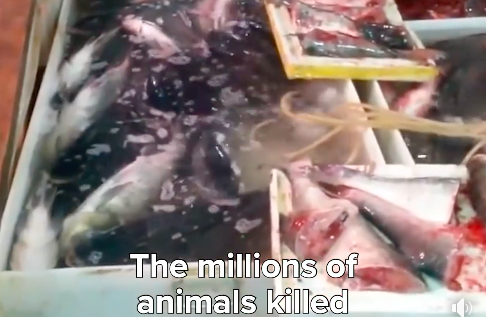Elephant’s Continually-updating Coronavirus Diary. ~ Waylon
~
As a lifelong vegetarian—now vegan—who has never tried or ate fish, chicken, or animals, I can’t understand how humans eat animal flesh, once living, feeling, and breathing beings that feel emotions, communicate, and have families, just like us.
As the Coronavirus spreads throughout the world, although not 100 percent confirmed yet as to why, it is possible and likely this virus came from “wet markets” in China, markets that are exploiting and violently harming animals of all kinds (after holding them in captivity), and then slaughtering them.
All animals want to avoid suffering and live, just like humans. As Dharma Mittra, the 80-year-old vegan yoga master says, to evolve we must “expand our compassion beyond our pets.”
So here is yet another reason to stop eating animals.
Now, not only will it benefit your health, the earth, and save animals, as well as the violence that causes karmic repercussions when human beings harm and kill animals, it also can prevent disease from spreading in the form of viruses. Ingesting and eating animal flesh increases and can even cause heart disease, certain cancers and other diseases. (Karmic repercussions can be in this lifetime, as in causing diseases in humans from eating animals, as well as ecosystem changes on our land and in our oceans from harming the earth).
I teach Stress Management (yoga and meditation) for the Ornish Heart Disease Reversal Program in Northern California, which is a research-based and proven program that shows how going vegan or vegetarian (with exercise, yoga, and support), can reverse heart disease. We know for sure that a plant-based vegan diet can prevent many diseases.
But this Coronavirus has given us another reason to ponder why going vegan is beneficial for everyone (the animals and Earth included). Instead of recreating the words to describe this in more detail, I will share some recent information on the topic for a more detailed explanation (with links to read more).
You can decide for yourself: do you want to improve your health, help reduce animal suffering, promote compassion (not violence), support Earth’s sustainability, and also decrease the spread of worldwide viruses? Sounds like a good idea to me!
“Both the new coronavirus and SARS outbreaks likely started in Chinese wet markets. The novel coronavirus and the SARS outbreak of 2003 have two things in common: Both are from the coronavirus family, and both most likely started in wet markets.
At such markets, outdoor stalls are squeezed together to form narrow lanes, where locals and visitors shop for cuts of meat and ripe produce. A stall selling caged chickens may abut a butcher counter, where meat is chopped as nearby dogs watch hungrily. Some vendors hock hares, while seafood stalls display glistening fish and shrimp.
Wet markets put people and live and dead animals—dogs, chickens, pigs, snakes, civets, and more—in constant close contact. That makes it easy for zoonotic diseases to jump from animals to humans.
‘Poorly regulated, live-animal markets mixed with illegal wildlife trade offer a unique opportunity for viruses to spill over from wildlife hosts into the human population,’ the Wildlife Conservation Society said in a statement.
In the case of SARS and the new coronavirus disease, called COVID-19, bats were the original hosts. The bats then infected other animals, which transmitted the disease to humans. The coronavirus has now killed at least 2,700 people and infected more than 80,000 others.”
From “Eating Animals Will Be The Death Of Us”:
“There are many discussions taking place about how we can prevent and stop the spread of disease, followed by calls from experts for better hygiene, tighter controls at airports, banning the unregulated movement of wild animals and limiting human-animal contact.
But the obvious solution, the simplest, most cost-effective solution which no-one has yet to admit, is to stop eating animals.
This coronavirus originated from one of Wuhan’s many live-animal markets. Over 100 different animals are sold here, including wolf pups, civet cats, poultry and snakes.
These animals are kept in cramped, dirty conditions, with direct contact with humans. These markets are referred to as ‘wet markets’ – so called because animals are often slaughtered directly in front of customers.
Aside from the obvious issues with having a high population density made up of humans and animals – a hotbed for disease outbreak – these markets are repulsive places. They are filled with caged, frightened animals, many of which have been captured illegally in the wild.
The animals are skinned and slaughtered, sending a cocktail of microorganisms into the air. The dreadful, cramped conditions and mix of wild and domestic creatures, alongside the throngs of people choosing their victims, is a pandemic in the making.
It was an inevitable consequence of poor hygiene, cross-contamination, and low animal welfare. The saddest part of this story is that scientists saw this coming. Researchers have been stressing the link between human and wildlife health for decades and, in particular, the potential threat of coronaviruses was first identified following the 2003 SARS outbreak (also caused by a virus jumping from animals to humans).
Scientists studying bats in the Yunnan Caves realised that the coronavirus was making the jump from bats to humans. It is now thought that the virus spread from bats to snakes, which are then captured and taken to live animals markets and eaten as a local delicacy.
Scientists saw this coming; the Wuhan animal markets merely presented the perfect storm for disease outbreak.
As much as we can improve hygiene and as much as we can control the movement of animals, all it takes is another perfect storm to spark the next pandemic.”
From Gene Bauer, president and co-founder of Farm Sanctuary (Animal Rescue Farm):
“SARS, MERS, and COVID-19 are contagious diseases that jump from animals to humans, and more needs to be done to curtail these, including banning live animal markets. But, other potentially fatal zoonoses also warrant attention.
The Centers for Disease Control and Prevention (CDC) warns: ‘…3 out of every 4 new or emerging infectious diseases in people come from animals.’ These include viruses, bacteria, fungi and parasites, and they infect millions of U.S. citizens every year.
In the U.S., almost ten billion animals are exploited and slaughtered every year. Most live short miserable lives in overcrowded factory farms, which are a breeding ground for disease, including emerging pathogens and virulent strains of antibiotic-resistant bacteria.
In addition to foodborne illness and environmental pollution, animal agriculture can also incite global pandemics like H1N1, which was initially called ‘swine flu’ because it was linked to a similar disease in pigs, but its connection to animal agriculture has since been largely obscured.
Transitioning agriculture and government policies will take time, but each of us can make daily choices to help the planet and ourselves. Eating nutritious, plant-based foods can help fortify our immune systems, thereby enhancing our ability to withstand various threats, including from contagious viruses like COVID-19.
Our disrespectful treatment of other animals and the earth has consequences, and when they are harmed, ultimately, so are we. All life on Earth is connected, and it’s in our interest to act accordingly.”
~
~
Relephant:









Read 5 comments and reply